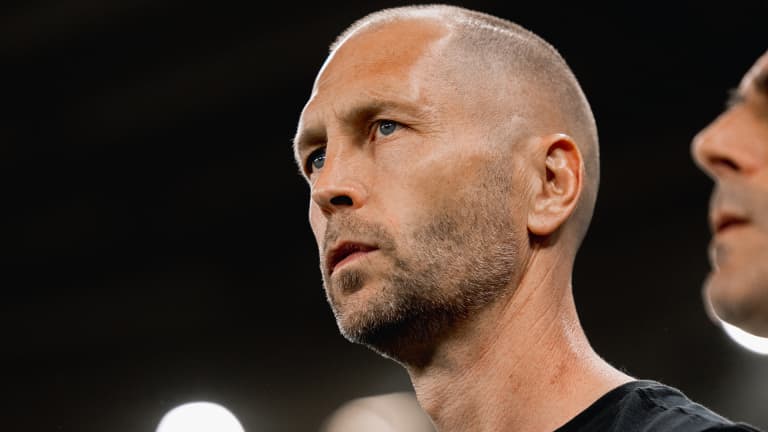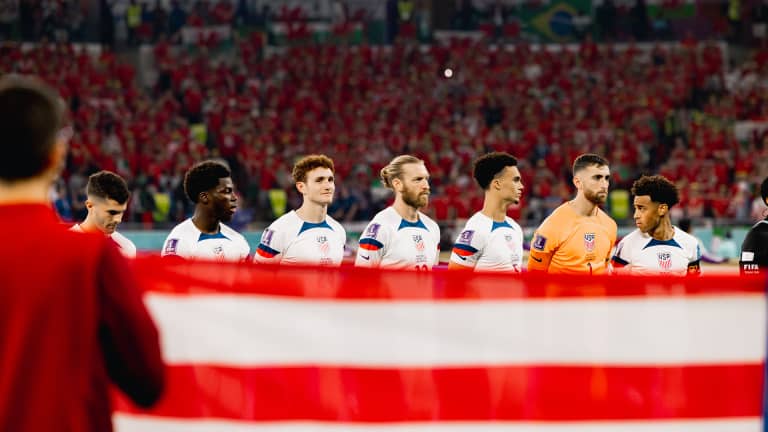WASHINGTON – U.S. Soccer unveiled its new sporting director Matt Crocker on Tuesday, with federation president Cindy Parlow Cone and CEO JT Batson leading him on a morning sightseeing tour of his new country’s capital city before introducing him to the media in an online press conference.
With a subsequent train ride up the Mid-Atlantic coast for a similar visit to New York City, it was a whirlwind tour for the Welshman, who doesn’t even start his new job on a full-time basis until Aug. 2.
In the meantime, he’ll do everything in his power to help his incumbent employers, Southampton FC, dodge relegation between now and the final EPL matchday on May 28. And he’ll begin the search for the next US men’s national team head coach right away.
“For me, it's about us selling the vision, first and foremost,” Crocker explained in an in-person roundtable with reporters at a downtown D.C. hotel. “So I don't see the interview process starting with ‘what do you offer us?’ For me it’s, ‘this is our program, this is the vision, this is where we're going to be going, we've got 2026, we've got the legacy piece afterwards.’ And I want to make sure the coaches understand that, and they get excited about what they're adding to that program, rather than ripping up, starting again and just bringing in their own philosophy and their own ideas.”
Crocker is a big-picture thinker, known as an architect of long-range projects like Southampton’s fertile youth academy and the impressive rejuvenation of England’s player development pathways that racked up a bevy of youth international titles and helped return their senior side to the global elite.
Now he’s charged with steering the United States’ national teams to comparable advances at a pivotal juncture. With the North American 2026 World Cup looming, a just-launched US bid to co-host the Women’s World Cup with Mexico the following year and great expectations for both the men’s and women’s programs, Crocker said he had to “pinch himself” when initially approached about his interest in the position.
“What I see from the current team is an aggressive, forward-thinking [style], a fearless team, that went to the World Cup and did some great stuff,” Crocker said of the USMNT. “And I'm really, really keen to make sure that we produce a coach that can replicate and continue to drive forward some of those behaviors.
“Clearly, there's been some great foundations put in place by Gregg [Berhalter] and by Anthony [Hudson] around the style of play, and we want to continue to evolve that style of play. So to bring a coach in that can deliver that is also going to be fundamental to the process.”

Beyond praising those who led the Yanks over the past four-plus years, he repeatedly emphasized his desire to listen and learn at length before making moves. That could well mean a search just as long as the three-month hunt that resulted in his selection, perhaps longer.
“No,” said Crocker when asked whether he’s yet had any conversations with potential USMNT coaching candidates. “And even if I had, I wouldn’t tell you, because you want to project professionalism, confidentiality of us and those individuals.
“For us at the moment, it's about making sure that we nail the process: What exactly do we want to find out? Making sure that we've got the right data models to give us the information, to making sure that we've got the right background checks to give us a leadership style. And then to make sure that we provide the right opportunities for the coaches to come in and show their best selves.”
His predecessor, Earnie Stewart, implemented a requirement that national-team coaches be based at USSF headquarters in order to foster collaboration, organizational culture and the like. Crocker paid tribute to that concept while sounding flexible about the USMNT coach’s extensive array of responsibilities.
“I guess what is important is that they can get to Chicago and be in Chicago on a regular basis,” said the Welshman, who experienced the United States’ fledgling soccer culture by coaching at summer camps in Arkansas and Kansas as a young adult. “When you're an international manager, the last thing that we want is a coach that just shows up for the camps. This is a 365 job … Because if we are going to get that aligned pathway, the contribution of the head coach and making sure that they can impact and influence what goes on at the younger age groups, and also be around those camps, supporting those players, know what players are coming through, is a fundamental part of the job.
“Whether they need to live there 365 days a year, probably not, because there's also European [matches] you definitely need to go and watch, across all of MLS to cover games. But they are going to need to spend a significant chunk of time in Chicago, that's for sure.”

Hudson, the USMNT’s interim coach, is under contract until August, and federation officials’ public messaging has given the impression they’re comfortable with him leading the Concacaf Nations League and Gold Cup title defenses this summer. There’s a collective desire to cast a broad net for the optimal combination of characteristics for maximizing performance on home soil in ‘26.
“You need to be an unbelievable planner at international level,” Crocker, who is under contract until the ‘26 World Cup, noted. “The games come thick and fast and if you aren't pre-planned and prepared, which takes weeks and months in advance, and that’s team operations, the type of environment that you want to go to, the type of hotel, all of those things when you're away for a long, long period of time, play a significant part of whether you can be successful or not.
“It would be remiss,” he added, “just to go for a coach who was a tactical genius, because you don't get that time every day. And the impact you need to have sometimes is when the players aren't with you, and how much time you invest in the care and attention and the relationships with players and staff is critical to the success, in my humble opinion.”
Above all, Crocker wants the next USMNT boss to be a special character, someone who can not only organize, strategize and synchronize, but also inspire.
“We need the right leader,” he said, “to come in and give the players ownership and responsibility to build a really, really strong culture, or to continue to develop that really, really strong culture. And coaching internationally is very, very different to working every day on the field with a club team.
“There's some significant advantages around building emotional connections with the players,” he added. “We clearly want a head coach that is a role model and a cultural leader as well and can inspire the next generation. So the legacy piece around the future is as important, if not more important, than building up to the next World Cup.”













